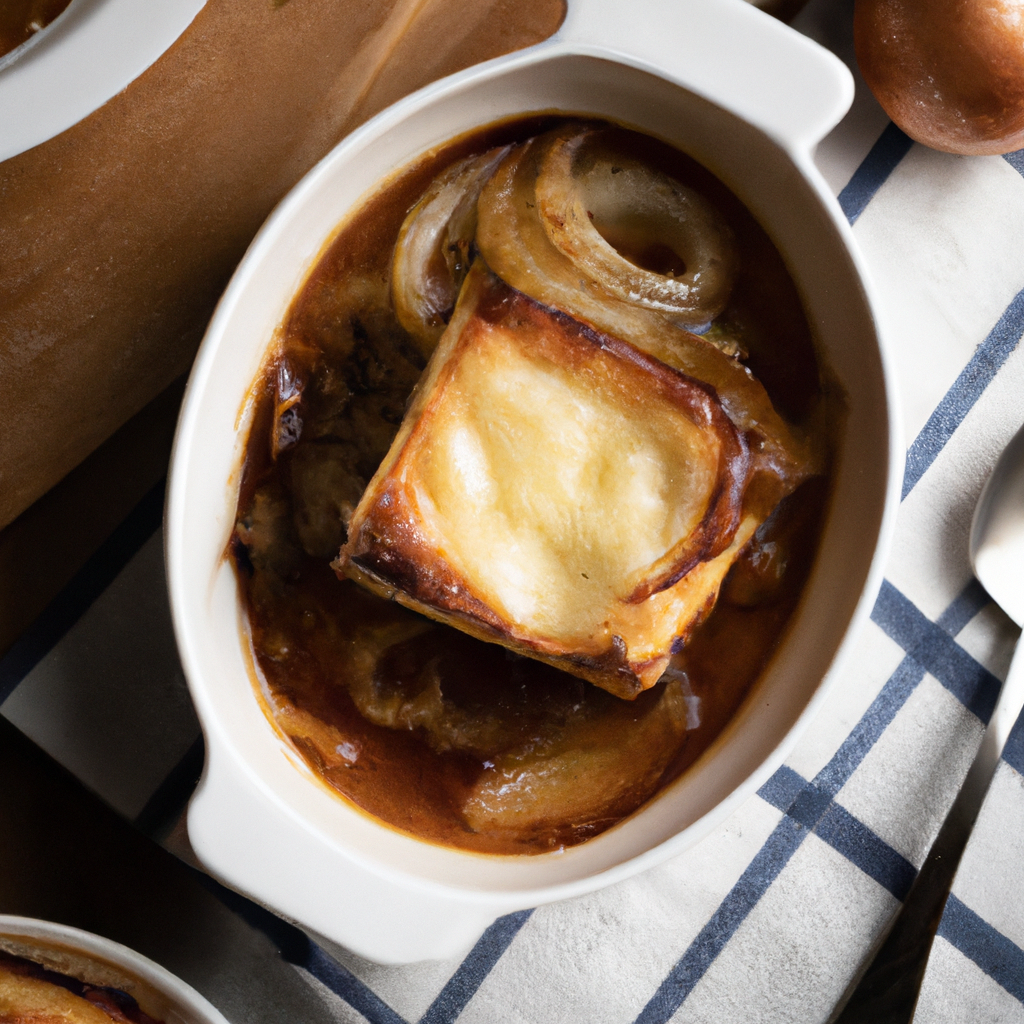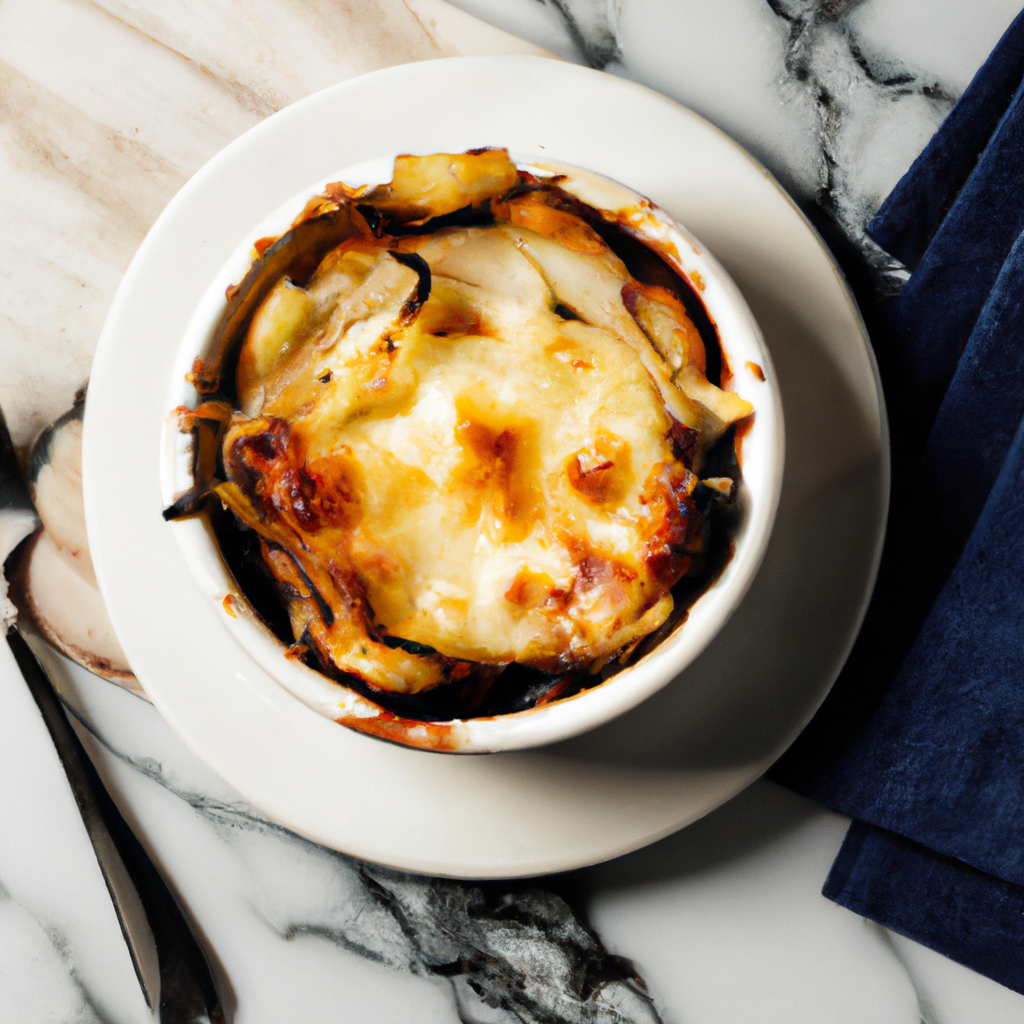Picture this: You’re sitting in a cozy French bistro, surrounded by the comforting aroma of simmering onions and warm homemade broth. As you eagerly await the arrival of your steaming bowl of French onion soup, you can’t help but wonder about its origins. Who was the culinary mastermind behind this irresistible creation that has found a cherished place in menus worldwide? In this article, we’ll unravel the fascinating tale of who invented French onion soup, tracing its roots back through time to uncover the genius behind this beloved dish. Get ready to embark on a delicious journey of discovery!

Introduction
Welcome to the fascinating world of French Onion Soup! This beloved culinary masterpiece has been warming hearts and tantalizing taste buds for centuries. With its rich flavors and comforting warmth, French Onion Soup has become a staple in French cuisine, but have you ever wondered about its origins and the people behind its creation? In this article, we will delve into the intriguing history of French Onion Soup, from its ancient roots to its modern-day popularity. So grab a bowl of this delectable soup and let’s dive in!
Origins of French Onion Soup
Ancient History of Onion Consumption
The story of French Onion Soup begins with the humble onion. Onions have been a part of human diets since ancient times, thanks to their versatility, affordability, and flavor. The cultivation of onions can be traced back to thousands of years ago in Egypt and Mesopotamia. These civilizations not only recognized the nutritional value of onions but also valued their medicinal properties.
The Development of Culinary Techniques
As civilizations advanced and culinary techniques evolved, onions found their way into various dishes. Onion-based recipes have been found in ancient texts from Greece and Rome, indicating their popularity and widespread use in ancient Mediterranean cuisine. These early civilizations experimented with different cooking methods, including roasting, frying, and boiling, paving the way for the creation of soups.
Creation of Soups in Ancient Times
Soups have been an integral part of human culinary history for centuries. In ancient times, soups were often made by combining ingredients readily available, such as vegetables, grains, and meat, with water or broth. These soups offered nourishment, warmth, and versatility in utilizing ingredients. It is within this context that the concept of onion soup began to take shape.
Early Versions of Onion Soup
Ancient Egyptian Onion Soup
One of the earliest known examples of onion soup can be traced back to ancient Egypt. The Egyptians combined onions, garlic, and various herbs with water or broth to create a savory and aromatic soup. This ancient Egyptian onion soup was not only a staple food but also held religious significance. Onions were believed to have divine qualities and were often used as an offering to the gods.
Ancient Greek Onion Soup
The ancient Greeks also had their version of onion soup, known as “mageiros.” They combined onions with olive oil, wine, and herbs to create a flavorful and nourishing soup. This soup was enjoyed not only for its taste but also for its medicinal properties. The Greeks believed that onions had cleansing properties and could help alleviate various ailments.
Medieval Onion Soup
Influence of Arab Cuisine
During the medieval period, Arab cuisine had a significant influence on culinary traditions in Europe. Arab traders and scholars brought with them a range of spices, herbs, and cooking techniques that greatly enriched European cuisine. Onions, being a versatile and readily available ingredient, continued to play a prominent role in the development of soups during this time.
Onion Soup in Medieval Europe
In medieval Europe, onion soup gained popularity as a hearty and nourishing dish. Many variations of onion soup emerged, often incorporating locally available ingredients such as bread, cheese, and herbs. It was during this time that onions became a staple in European kitchens, with their warm and earthy flavors enhancing the taste of soups and stews.

French Culinary Renaissance
Evolution of French Cuisine
The Renaissance period brought about a revolution in French culinary traditions. French cuisine, renowned for its elegance and sophistication, began to flourish during this time. The emphasis on high-quality ingredients and meticulous cooking techniques laid the foundation for the development of iconic French dishes, including French Onion Soup.
Emergence of Onion Soup in France
While onion soup had been enjoyed in various forms throughout Europe, it was in France that it truly flourished. The French, with their culinary prowess and knack for combining flavors, elevated onion soup to new heights. Onions were caramelized to perfection, creating a rich and sweet base for the soup. This technique transformed onion soup into an indulgent delicacy fit for kings and queens.
The Role of Les Halles Market
Les Halles and Its Contribution to French Cuisine
Les Halles Market, located in Paris, played a vital role in the development and popularization of French cuisine. Established in the 12th century, Les Halles became the bustling center of culinary commerce. The market offered a wide variety of fresh ingredients, including onions, to the chefs and cooks of Paris. This abundance of ingredients allowed for the creation of flavorful and aromatic dishes, such as French Onion Soup.
Onion Soup and Les Halles
Les Halles Market provided a constant supply of onions, making them readily available to French cooks. The market’s vibrant atmosphere and bustling trade inspired culinary innovation, and onion soup soon became a beloved classic in Parisian kitchens. Les Halles Market became synonymous with the vibrant flavors of French cuisine, and French Onion Soup became one of its shining stars.
The 18th Century: The Golden Age of Onion Soup
Popularization of Onion Soup in France
The 18th century marked the golden age of French Onion Soup. This hearty dish became a staple in both humble households and aristocratic dining rooms. The French appreciated the soup’s simplicity, depth of flavor, and ability to warm both body and soul. Onion soup was enjoyed across social classes, firmly establishing itself as a beloved French dish.
Creation of Modern Recipes
As French cuisine continued to evolve, chefs and cooks began to refine and perfect the recipe for onion soup. The addition of beef broth, the use of Gruyère or Emmental cheese as a topping, and the toasting of bread under the broiler became standard techniques in modern French Onion Soup recipes. These additions elevated the soup to new heights, providing layers of flavor and textures that are now synonymous with the dish.
Potential Inventors of French Onion Soup
La Varenne: The First Published Recipe
François Pierre de La Varenne, a French chef and author, is often credited with publishing the first formal recipe for French Onion Soup in 1651. La Varenne’s cookbook, “Le Cuisinier François,” included a detailed recipe that showcased the elegance and richness of this iconic dish. His contribution to French cuisine and his inclusion of French Onion Soup in his cookbook ensured its enduring place in culinary history.
Auguste Escoffier: Innovator of Classic Cuisine
Auguste Escoffier, a legendary French chef, is recognized for his immense contributions to the development of classic cuisine. While Escoffier did not invent French Onion Soup, he played a significant role in popularizing and refining the recipe. His culinary expertise and meticulous approach to cooking elevated onion soup to new levels of excellence, solidifying its status as a classic French dish.
Conclusion
French Onion Soup represents the harmonious blend of history, culinary innovation, and cultural significance. From its ancient roots in Egypt and Greece to its flourishing in medieval Europe and ultimate refinement in France, this soup has captured the hearts, and taste buds, of people worldwide. The inventors and innovators who shaped French Onion Soup have left a delicious and enduring legacy that continues to delight and inspire both amateur cooks and professional chefs. So go ahead, savor a bowl of this comforting soup while appreciating the rich heritage and traditions that have gone into its creation. Bon appétit!
